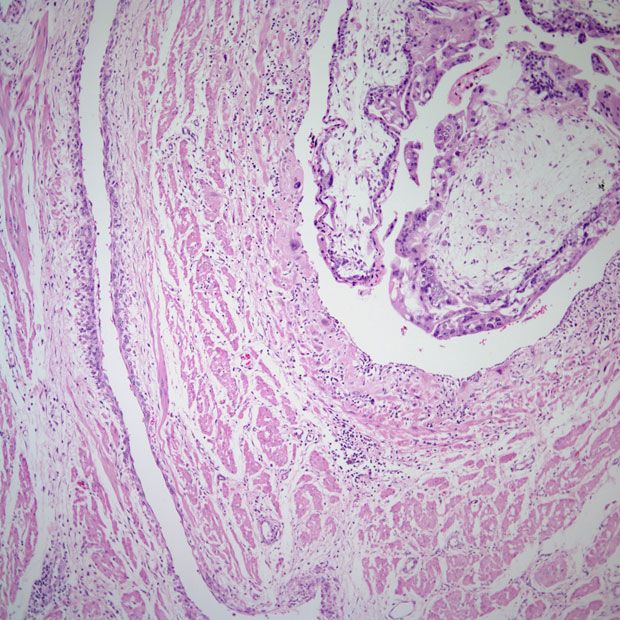FDA Grants FTD to Tulmimetostat in Advanced ARID1A+ Endometrial Cancer
Data from a phase 1/2 trial support the fast track designation for tulmimetostat as a treatment for patients with ARID1A-mutated advanced, recurrent or metastatic endometrial cancer.
Investigators of an ongoing phase 1/2 study (NCT04104776) are evaluating the anti-tumor activity and safety of tulmimetostat in patients with different types of advanced solid tumors and lymphomas, including those with ovarian clear cell carcinoma, pleural or peritoneal mesothelioma, and metastatic castration-resistant prostate cancer.

The FDA has granted fast track designation to the investigational EZH2 and EZH1 inhibitor tulmimetostat for patients with ARID1A-mutated advanced, metastatic or recurrent endometrial cancer that has progressed following at least 1 prior line of therapy, according to a press release from MorphoSys.1
Supporting data for the designation came from a phase 1/2 trial (NCT04104776) in which investigators are assessing tulmimetostat in patients with advanced solid tumors or lymphomas, including those with ARID1A-mutated endometrial carcinoma.
According to data from a poster presented at the 2023 American Society of Clinical Oncology (ASCO) Annual Meeting, of the 81 patients who were treated with tulmimetostat 2 patients experienced a confirmed partial response (PR), and 2 others had confirmed stable disease in a cohort of 8 evaluable patients with endometrial carcinoma.2 Additionally, 1 patient had an unconfirmed PR in a cohort of 10 evaluable patients with other types of ARID1A-mutated solid tumors.
Based on data from the safety analysis, the most common any-grade, treatment-emergent adverse effects (TEAEs) potentially related to treatment with tulmimetostat included thrombocytopenia (50.6%), diarrhea (45.7%), anemia (35.8%), and nausea (33.3%). Investigators also reported that frequent grade 3 or higher TEAEs included thrombocytopenia (24.7%), anemia (14.8%), and neutropenia (13.6%). TEAEs led to dose modifications in 77.8% of patients, dose modifications in 38.3%, and dose interruptions in 70.4%. Investigators concluded that the safety profile of tulmimetostat in the trial was consistent with prior reports concerning the mechanisms of EZH2 inhibition.
“Receiving fast track designation from the FDA for tulmimetostat in ARID1A-mutated endometrial cancer underscores this investigational therapy’s potential in a patient population with limited treatment options,” Tim Demuth, MD, PhD, chief research and development officer at MorphoSys said in the press release.1 “The preliminary results from our phase 1/2 study of tulmimetostat are very promising. We will continue to generate data from this study across tumor types to inform our future development plans for tulmimetostat, both as a monotherapy and in combination with other treatments.”
Investigators of the ongoing phase 1/2 study are evaluating the anti-tumor activity and safety of tulmimetostat in patients with different types of advanced solid tumors and lymphomas, including those with ovarian clear cell carcinoma, pleural or peritoneal mesothelioma, and metastatic castration-resistant prostate cancer. Findings from the phase 1 portion of the study supported a recommended phase 2 dose of tulmimetostat at 350 mg once a day.
The trial’s primary end point is investigator-assessed overall response rate. Secondary end points include progression-free survival, time to progression, duration of response, time to response, disease control rate, overall survival, safety, and pharmacokinetics.
All patients needed to have a life expectancy of at least 12 weeks, an ECOG performance status of 0 or 1, and adequate bone marrow, renal, and liver function to enroll on the trial. In the ARID1A-mutant solid tumor cohort, patients needed to have a known ARID1A mutation, disease progression on or after a prior line of chemotherapy, and measurable disease per RECIST v1.1 criteria to enroll. To be eligible for the endometrial cancer cohort, patients needed to have at least 1 line of platinum-based treatment in the recurrent or metastatic setting, brachytherapy if they underwent treatment more than 12 weeks before beginning study treatment, and measurable disease.
References
- MorphoSys receives U.S. FDA fast track designation for tulmimetostat in endometrial cancer. News release. MorphoSys. September 12, 2023. Accessed September 14, 2023. https://shorturl.at/msEZ5
- Drescher C, Walter HS, Gastinne T, et al. EZH2/EZH1 inhibitor tulmimetostat (CPI-0209) in patients with advanced solid tumors or hematologic malignancies: preliminary phase II results. J Clin Oncol. 2023;41(suppl 16):3094. doi:10.1200/JCO.2023.41.16_suppl.3094